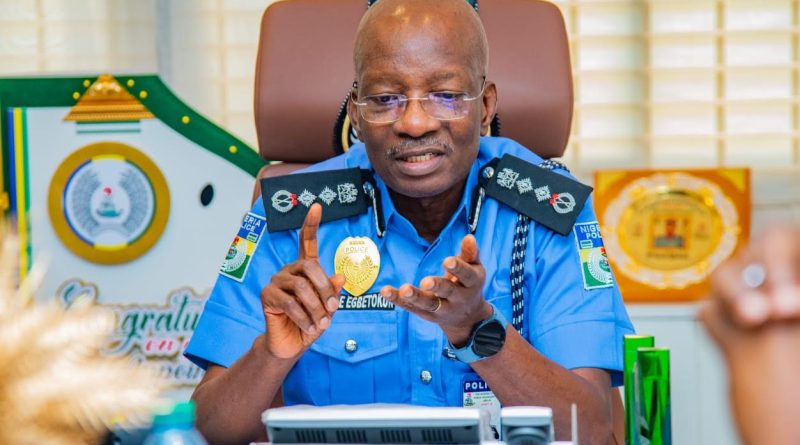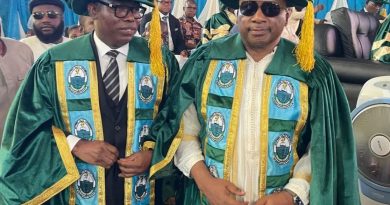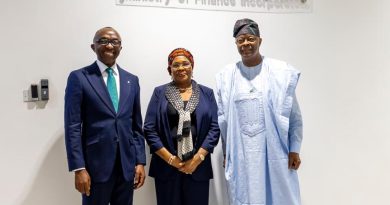Protest: NHRC Asks Security Agencies To Provide Adequate Protection For Protesters
By Bukar BOLORI
The National Human Right Commission has urged security agencies to provide adequate protection for individuals exercising their right to protest.
The advised was given on Monday in Abuja, following Twarnings by the government and security agencies against the planned protest against hardship by Civil Society Organisations.
Speaking at a press conference, the Executive Secretary of NHRC, Dr. Tony Ojukwu, also urged the Federal government to provide adequate security for the journalists that would be covering the protest.
Ojukwu asked the Federal Government to put in place a mechanism to hold security agencies accountable for any abuses committed during protests and warmed against any form of barriers during the protest.
He advised protesters to carry out their protest within the ambit of the law.
He said: “We call on the federal and state government to ensure that the October protests are peaceful and that the protesters are given the necessary support and leverage to conduct themselves in civilized manner, including protecting them from counter-protesters and mobs.”
He also added that both federal and state government and their institutions are obliged to facilitate peaceful assemblies.
“This includes ensuring safety, providing necessary infrastructure, and taking measures to prevent disruptions from counter-demonstrators or hostile forces.
“Government should provide adequate protection for protesters against violence or intimidation as well as facilitate peaceful assemblies through appropriate measures.
“Government must put in place effective Accountability Mechanisms for holding the law enforcement and security agencies accountable for any abuses committed during protests. This includes investigating incidents where excessive force was used or where protesters were unlawfully detained.
“Government must deploy its apparatus for the protection of private and public properties as well as the lives of protesters and non-protesters before, during and after the protests.”
He insisted that the right to peaceful assembly is a fundamental human right recognized internationally, regionally, and at national level.
He noted that “In Nigeria, this right is enshrined in Section 40 of the 1999 Constitution of Nigeria as amended and further strengthened by international and regional human rights instruments. Section 40 provides that:
“Every person shall be entitled to assemble freely and associate with other persons, and in particular, he may form or belong to any political party, trade union or any other association for the protection of his interests.
“Furthermore, article 11 of the African Charter on Human and Peoples’ Rights (ACHPR) provides that “Every individual shall have the right to assemble freely with others.
“The right to peaceful assembly is the cornerstone stone of our liberty and an essential instrument for promoting the values of democracy and good governance. Protests are legitimate means of voicing dissatisfactions and participating in shaping citizen-centred governance and development outcomes.”
He stressed that the African Commission on Human and Peoples’ Rights and the Human Rights Council have put in place a set of principles which should guide the promotion and protection of the right to peaceful assembly.
The principles he said include: “Non-discrimination: All individuals should be able to exercise their rights to peaceful assembly without discrimination based on race, gender, political affiliation, or any other status.
“Legitimate Restrictions: While freedom of association and assembly is fundamental, it can be subject to restrictions. However, such restrictions must be lawful, necessary in a democratic society, and proportionate to the aim pursued. This means that any limitations imposed by Nigerian authorities must not infringe upon the essence of these rights.
“Protection from Violence: The state has an obligation to protect individuals exercising their rights from violence or intimidation by third parties. This includes ensuring that protests can occur without fear of repression, prosecution or violent backlash.
“Notification Requirements: Requirements for pre-notification of law enforcement should not serve as barriers but rather facilitate peaceful protests. Notification requirement should not be burdensome and not hinder the exercise of this right.
“Use of Force: Any use of force by law enforcement during protests must adhere strictly to principles of necessity and proportionality. Excessive use of force against protesters, including shooting or the deployment of tear gas is a violation of human rights and dignity.”
He said: “Exercise your right to peaceful protest within the ambits of the law, be very civil and respect the rights of others.
“Avoid violence, destruction of property, and harmful behaviour, this is detrimental to nation building, the destruction caused may take fortune to regain which will be a great set back to our development.
“Cooperate with law enforcement agencies to ensure public safety by conducting yourselves with highest sense of modesty and civility.“Refrain from hate speech and divisive rhetoric, abusive words and foul language.
“Respect the rights of others, including those who may hold differing opinions, that is the beauty of democracy.
“Ensure that your actions do not infringe on the rights of non-protesters, as everybody must not be on the street protesting.
He promised that the NHRC will be monitoring the protests across Nigeria and will ensure that state and non-state actors violating the right to protests and other associated human rights will be held accountable.
For the security operatives, Ojukwu urged them to “Respect the rights of protesters to peaceful assembly and expression as enshrined in the 1999 Constitution and other Regional and International Instruments that Nigeria is a Party to.
“Avoid excessive force and ensure proportionate response to situations, do no harm and do not force the protesters to react in a manner that is riotious.
“Protect journalists and media personnel from harassment, allow them to carry out their duties as the fourth arm of the government and as enshrined in the constitution.
“Facilitate dialogue between protesters and relevant stakeholders, this will rather assist you in discharging your role seamlessly, do not look at them as your enemies.
“Ensure that arrests and detentions are carried out in accordance with the law and not because you merely want to deal with people.
“Provide necessary assistance and support to vulnerable individuals, do not overlook any opportunity to render help.”




